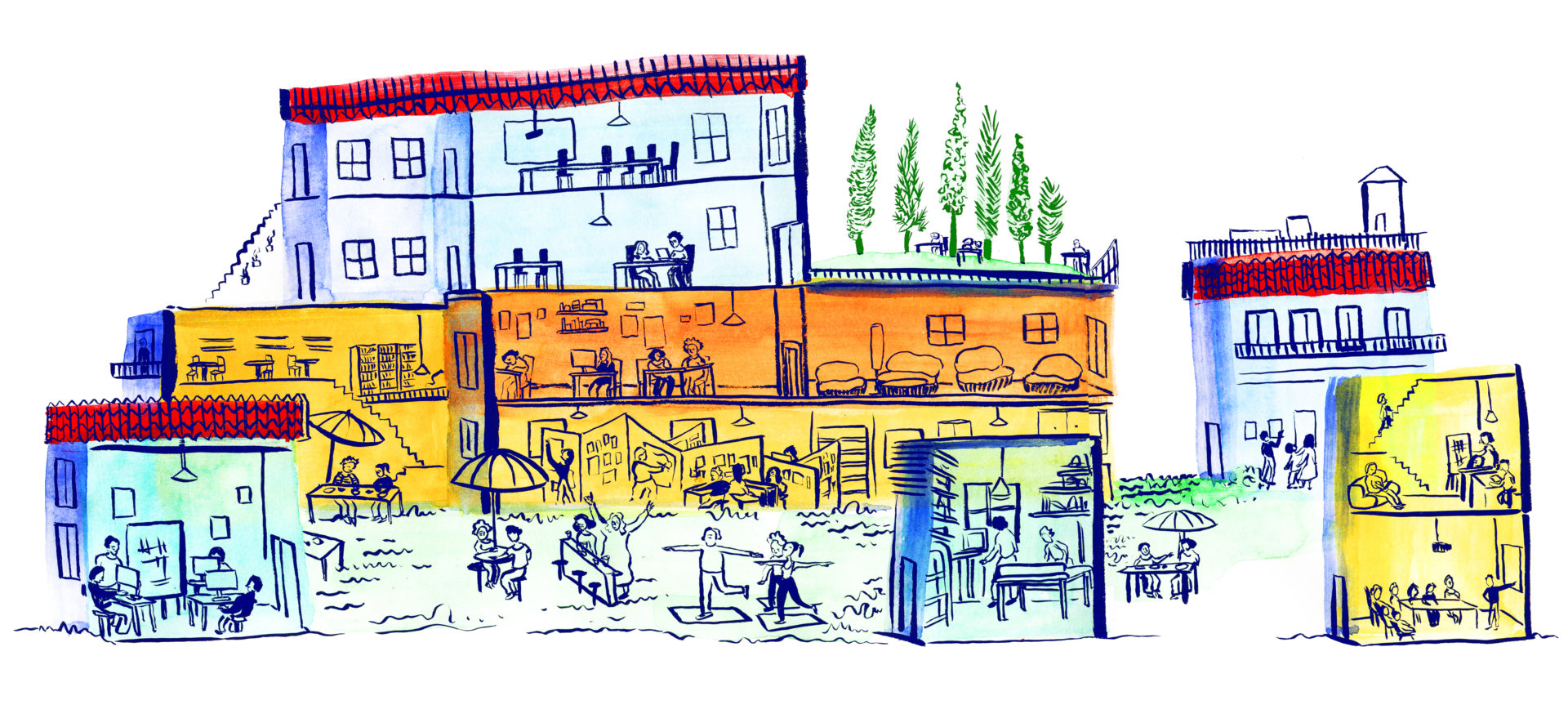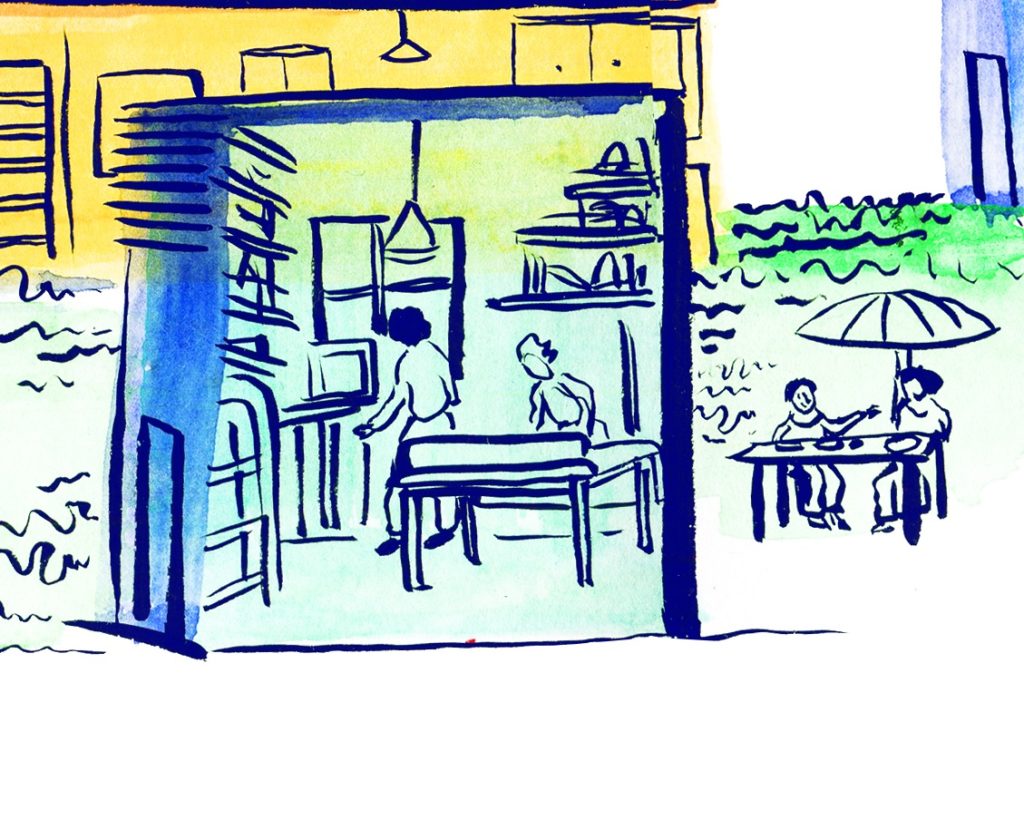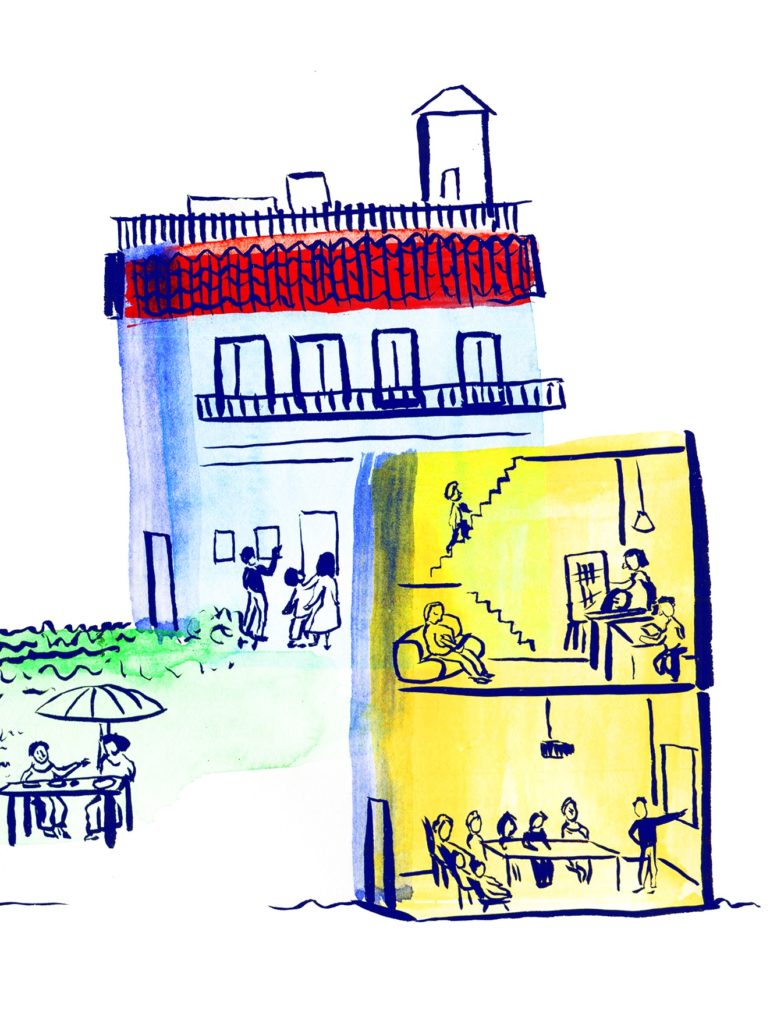How can artistic representations might transform patterns of cultural consumption, production, work-life balance, and our relation to urban spaces? Susy Silva looks at how artists can change the workplace where business communities can flourish meeting the needs of creative businesses. She asked Beatriz Bagulho to visually translate her thoughts about her workplace, what it could be.
The creative village
Beatriz is an illustrator and animator, born in Lisbon, 1997. Her workspace has been a business creative incubator in one of the oldest neighbourhoods in Lisbon. When I asked for her help to understand how a cultural and creative community could now share a workspace, she documented her world and its people and came to me with a picture of a place that includes every sphere of life. It shows the broader, holistic reach when you address individuals at the centre of what they do.
So, can cultural and creative entrepreneurs drive the demand for better work places and a more human centred approach to a wellbeing standard of society? Can artists interpret and link the subject of utopias in collaborative spaces to a vision of a thriving utopian collective?
The spaces we inhabit shape who we are and how we behave. As we already know, collaborative places generate new ideas, support diverse communities, inspire innovation and create human value with social impact. But what Beatriz has done shows us that artists have tools and abilities to give back and reflect on reframing the balance between personal and work life, work notes for innovation: focus, learning, socialize, collaborate and wellbeing activities.
It’s not utopia if you can see it.


Artistic motivated problem-solving for the commons
As we look closer and zoom in the details of Beatriz’s coloured canvas it is clear that work and everyday life are both choreographed in the same setting. What could this mean? Should we consider a kitchen, a children’s school, a meeting room, a library and an atelier all in one space?
“To know that you are a part of a safe place that adapts and supports my personal and business unpredictability lowers my anxiety towards the future”, says Beatriz and adds: “having a central place to gather and collaborate in person remains essential to my creative process”.
We discussed our options, thinking about hybrid, mixed forms of a workspace with online and offline happenings, a service layer for businesses training and everyday personal endeavours: we came to realize the benefits of social gatherings in terms of emotional and intellectual fulfilment would be a crucial necessity for the overall health of a creative community.
This workplace design begins to place a home based feeling to the movement and needs of its occupants, who are set to work across different circumstances – from home to desk and from meeting room to atelier. These lines on paper aim to adjust every aspect of the relationship between user and an office space that looks, perhaps for the first time, truly holistic.

Let’s take a look at the picture
Any foresight value we attach to culture might well be influenced by an appreciation of artistic skills and toolsets, towards a vision to transform patterns of cultural consumption, production and work.
Snapshot
- Focus on training and talent development
- Innovative models of organizing and new cross-disciplinary collaboration
- Access to open minded environment and solutions
- Physical space for research and prototyping
- Quality of life endeavours

Beatriz and the policy makers
Entrepreneurship does not happened in a vacuum. We all face barriers in our own way. And our job as policy makers is to help individuals start their businesses and give them the individualized assistance they need to pursue their entrepreneurial needs. Policies for better lives should be the ultimate goal of policy making.
A sense of comfort and wellbeing happens at the front line in people’s homes and workplaces: office spaces, incubators, living labs, thriving spaces undergo radical adjustments both in how they are operated and what services are provided there. Beatriz’s type of business space is a living organism that is integrated in its ecosystem and can evolve with it. We are in dire need to reinvent the way we work and to transform our economy from within: a systemic transformation that starts where people are.
The importance of wellbeing is increasingly being recognised by national governments like the “SIN” countries: Scotland, Iceland and New Zealand. These governments have started to develop tools for integrating people’s wellbeing into their strategic objectives and agenda setting, policy analysis and budgetary processes.
These are the ultimate foundations for ecosystem builders as an approach for growing a professional field of cultural and creative entrepreneurial ecosystem, by creating a shared focus and narrative in complex multi-stakeholder space. The new paradigm is open, collaborative and connected.
What is a wellbeing economy?
A global movement is emerging among many organizations, networks, academics, businesses, NGOs, and individuals that are already working on elements of the new economy, considering the need to shift economies away from a narrow focus on marketed goods and services (i.e. GDP) to one more broadly focused on sustainable wellbeing – to the conclusion that the welfare of a nation can scarcely be inferred from a measurement of its national income.
Wellbeing is the outcome of a combination of factors, including human mental health, greater gender equality, worthy social relationships and a healthy natural environment. A wellbeing economy recognizes that meaning and thriving depend on far more than material consumption. This means ending the pursuit of perpetual growth, and building an economy that is regenerative, collaborative and purposeful.
There are a few examples of the many new directions, experiments, and metrics of the wellbeing economy already happening around the world:
- The World Happiness Report is an annual publication of the UN’s Sustainable Development Solutions Network to help demonstrate that wellbeing and happiness are critical indicators of a nation’s economic and social development. It measures life’s intangibles — feelings and emotions — that traditional economic indicators such as GDP were never intended to capture.
- The Eurobarometer collects data on life satisfaction as part of their public opinion surveys. The life satisfaction question is a summary measure of how people feel about all things related to their lives, ranging from personal satisfaction, health, family, economic condition to their views about society.
- Wellbeing Economy Alliance is a global initiative founded by a group of governments including Scotland, Costa Rica, Slovenia, and New Zealand committed to creating an organization through which to share good practice in wellbeing policy making and to champion wellbeing as the goal of development. In time, it is hoped this alliance will be an alternative to conventional groupings such as the G8 or G20.
